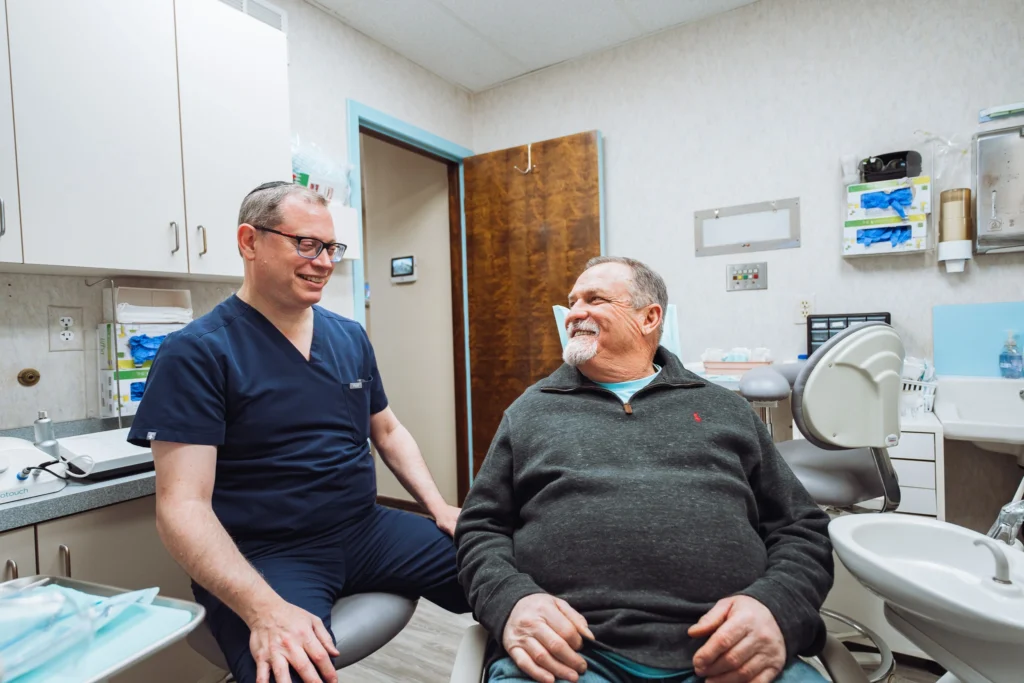
Diabetes and periodontal disease share a complex, two-way relationship. When your blood sugar levels remain elevated, your body becomes more vulnerable to infections, including those affecting your gums. At the same time, gum infections can make it harder to control your blood sugar, creating a cycle where each condition worsens the other.
If you have diabetes, you face a higher risk of developing periodontal disease, and your symptoms may progress more rapidly without proper care. The inflammation in your gums can interfere with your body’s ability to regulate glucose, while high blood sugar weakens your immune response and slows healing. Breaking this cycle requires attention to both your metabolic health and your oral health.
Your body relies on stable blood sugar levels to function properly. When diabetes disrupts this balance, your gums often bear the consequences. Elevated glucose levels in your saliva create an environment where harmful bacteria thrive, leading to plaque buildup and inflammation along the gumline.
High blood sugar also impairs your immune system’s ability to fight infection. White blood cells, which normally defend against bacterial invasion, become less effective when glucose levels spike. This compromised immune response means even minor gum irritation can quickly escalate into serious periodontal problems.
Additionally, diabetes affects blood vessel function, reducing the flow of oxygen and nutrients to your gum tissue while slowing the removal of harmful waste products. This impaired circulation delays healing and makes your gums more susceptible to infection and tissue damage.
The relationship works in reverse as well. Active gum infections trigger an inflammatory response throughout your body, causing your blood sugar to rise and making diabetes more difficult to control. The bacteria from periodontal pockets can enter your bloodstream, further complicating your metabolic balance.
Studies indicate that people with severe periodontal disease often experience greater difficulty maintaining target blood sugar levels. The chronic inflammation associated with gum disease can increase insulin resistance, requiring higher doses of medication or more frequent adjustments to your diabetes management plan.
Research from the American Dental Association shows that chronic periodontitis affects nearly half of adults over 30 in the United States, and this percentage increases significantly among people with diabetes. When left untreated, the condition may lead to tooth loss and jawbone deterioration, further impacting your quality of life and overall health.

Recognizing early symptoms can help you seek treatment before significant damage occurs. Pay attention to these common indicators of periodontal disease:
If you have diabetes and notice any of these symptoms, scheduling a periodontal evaluation becomes even more important. Your condition requires specialized care from a professional who understands the unique challenges diabetes presents to oral health.
Managing periodontal disease when you have diabetes requires a coordinated approach. Your East Brunswick periodontist may work closely with your physician to ensure your treatment plan addresses both conditions simultaneously. Controlling your blood sugar can improve your response to periodontal therapy, while treating your gum infection can help stabilize your glucose levels.
Laser dentistry offers particular advantages for diabetic patients. This minimally invasive approach targets infected tissue while promoting faster healing and reducing the risk of complications. The precision of laser therapy means less trauma to surrounding healthy tissue, which is especially beneficial when your body’s natural healing process is already compromised.
Deep cleaning procedures, including scaling and root planing, remove bacteria and tartar from below the gumline. For diabetic patients, these treatments may need to be performed more frequently to keep infection under control. Your periodontist will develop a maintenance schedule based on your specific needs and how well your diabetes is managed.
In more advanced cases, surgical intervention may be necessary to restore gum and bone health. Modern techniques focus on preserving as much natural tissue as possible while eliminating infection and promoting regeneration.
Prevention remains your most powerful tool in protecting both your gums and your overall health. Maintaining consistent blood sugar control reduces your risk of developing periodontal disease and improves your body’s ability to heal if infection does occur. Work with your healthcare team to keep your glucose levels within your target range.
Your daily oral hygiene routine becomes even more critical when you have diabetes. Brush twice daily with a soft-bristled toothbrush, floss at least once per day, and consider using an antimicrobial mouth rinse to reduce bacterial load. Replace your toothbrush every three months or sooner if the bristles become frayed.
Regular periodontal evaluations allow for early detection and intervention before problems become severe. Many patients benefit from more frequent cleanings, typically every three to four months rather than the standard six-month interval. This increased monitoring helps catch issues early when they are easier to treat.
Nutrition also plays a role in both diabetes and periodontal health. A balanced diet low in processed sugars supports better blood sugar control and provides the nutrients your body needs to maintain healthy gum tissue and fight infection.
Managing the intersection of diabetes and periodontal disease requires the attention of a skilled periodontist who understands how these conditions influence each other. At Middlesex Periodontics & Dental Implants, Dr. Daniel Reich brings over 28 years of periodontal experience to help diabetic patients achieve optimal oral health through specialized treatment approaches tailored to your unique needs.
As a board-certified Diplomate of the American Board of Periodontology and Director and Associate Professor of Periodontics at Touro College of Dental Medicine at New York Medical College, Dr. Reich combines advanced training with cutting-edge technology to deliver personalized treatment plans. No referral is needed to schedule your consultation, and our practice offers same-day emergency appointments when you need immediate attention.
We accept CareCredit financing to make your treatment more affordable, and we participate with Delta Dental Premier and Cigna PPO while working with many other dental PPO plans to maximize your coverage. Contact us today to take the first step toward breaking the cycle between diabetes and gum disease.